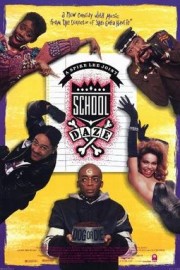School Daze
Spike Lee’s “School Daze” feels like a film that wants to be a joyous version of the teenage sex comedies and college comedies that populated the 1980s, only for the ending to want to seem like a reckoning of the culture they were a purveyor of; even if that might not have been Lee’s intent, I think the tension between the film’s narrative and how it finishes is as riveting a statement as Lee has ever made on film. One of the things that makes Spike Lee such an interesting filmmaker, even when he isn’t a successful one, is that he’s someone who ultimately would rather challenge an audience than hold their hand through difficult material. Because he doesn’t entirely bottle the end on a lot of his narrative ideas, “School Daze” doesn’t reach the heights of a “Do the Right Thing” or “Bamboozled,” for instance, but it’s so entertaining that we can’t help but go along with it, even if we’re left thinking the style is covering over gaps in the film’s substance.
The film takes place on the campus of Mission College in Atlanta, a fictional historically Black college, during Homecoming weekend. We begin with Vaughn “Dap” Dunlap (Laurence Fishburne) leading an anti-apartheid demonstration; apparently, the school receives funding from South Africa. At the same time, we see the rivalry begin with Julian “Dean Big Brother Almighty” Eaves (Giancarlo Esposito), the president of Mission’s Gamma Phi Gamma Fraternity, which Dap’s younger cousin, “Half-Pint” (Lee himself), is pledging. Dap knows that pledging changes people, so when Rachel (Kyme), his girlfriend, tells him she wants to rush for a sorority, it leads to a falling out. It’s unlikely the rest of the story will change his mind, especially when Julian’s actions go against Dap’s ideals.
I’m so accustomed to Lee as a serious filmmaker that seeing him- with his second film- make essentially a musical comedy is a bit disarming. But the soundtrack, which not only includes music by Lee’s father Bill, but also a variety of R&B and soul musical numbers that work beautifully in their individual sequences, is so energetic and has such a distinct feel that you cannot help but love it. Lee shows a strong aptitude at staging musical sequences here, even if the film feels shaggy in its overall narrative construction. Thematically, Lee is looking at ideas of what it means to be Black, and be a Black American, and be an activist while also trying to pursue more in your life. We see divisions in class, colorism and how different people make their place in society. Because there isn’t a white voice in the film to comment on things, we’re forced to listen as these Black characters are challenging each other to understand their choices, hoping that we will show some understanding for them on our ends. But Lee has never needed a specific voice to be an audience surrogate; his challenge to us is always telling the story he wants to tell, and taking it on faith that we will engage with his ideas. If we don’t, that’s on us, and Lee’s ideas engaged me more than his story did this time.
One of the things that show Lee struggling with the larger narrative of the film is how Dap’s cause seems to get lost in the end; is his plea for us to “wake up” intended to be his cry for change regarding South Africa? It doesn’t seem like it, because it comes after Half-Pint has shared what happened to get him into Gamma Phi Gamma, which has nothing to do with that cause. The film- inspired by Lee’s own time at Atlanta’s Morehouse College- is more about life on campus, and how these students view their choices, and what they mean for the future. It’s also about a rivalry between Dap and Julian, and while Fishburne and Esposito are both terrific, they can’t do anything to make me feel these two are going to come to an understanding by the ending; if anything, they are further apart. One of the other main characters is Jane Toussaint (Tisha Campbell), the president of the sister sorority to the Gammas, and she has a major part to play in the film’s ending, which for me, is a refutation of Greek culture on campus, which touts toxic masculinity at the expense of female self-esteem. Campbell has one of the most enjoyable performances Lee has directed, but the last few minutes of her work in this film is devastating because we can see where it’s heading, and why her sense of betrayal by the end is going to be so heartbreaking. Even if it doesn’t get there smoothly, where “School Daze” ends up is an important lesson for us all that our dignity should not come at the expense of others losing theirs. For me, that’s what we need to have woken up to by the end, whether it’s the need to stop being propped up by oppressive regimes as an institution, or not wanting something so much we have to humiliate someone to get it.










